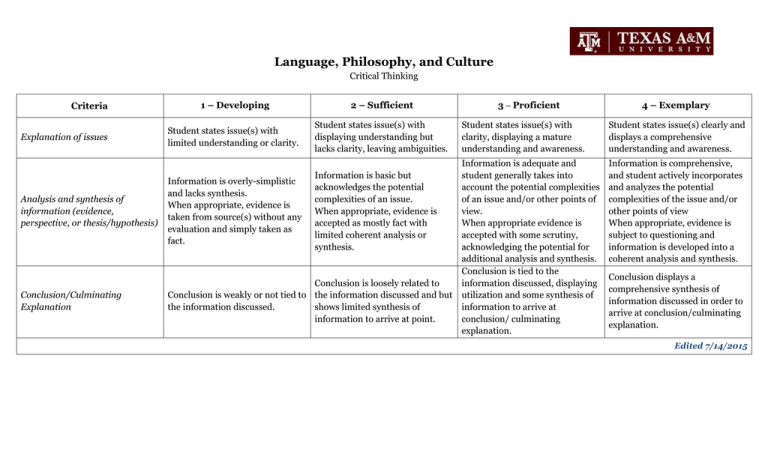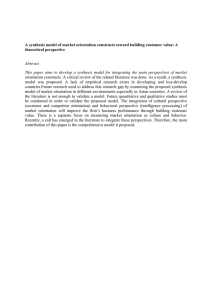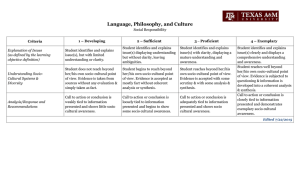Language, Philosophy, and Culture
advertisement

Language, Philosophy, and Culture Critical Thinking Criteria Explanation of issues 1 – Developing 2 – Sufficient Student states issue(s) with limited understanding or clarity. Student states issue(s) with displaying understanding but lacks clarity, leaving ambiguities. Information is basic but acknowledges the potential complexities of an issue. When appropriate, evidence is accepted as mostly fact with limited coherent analysis or synthesis. Analysis and synthesis of information (evidence, perspective, or thesis/hypothesis) Information is overly-simplistic and lacks synthesis. When appropriate, evidence is taken from source(s) without any evaluation and simply taken as fact. Conclusion/Culminating Explanation Conclusion is loosely related to Conclusion is weakly or not tied to the information discussed and but the information discussed. shows limited synthesis of information to arrive at point. 3 ‒ Proficient 4 – Exemplary Student states issue(s) with clarity, displaying a mature understanding and awareness. Student states issue(s) clearly and displays a comprehensive understanding and awareness. Information is adequate and student generally takes into account the potential complexities of an issue and/or other points of view. When appropriate evidence is accepted with some scrutiny, acknowledging the potential for additional analysis and synthesis. Conclusion is tied to the information discussed, displaying utilization and some synthesis of information to arrive at conclusion/ culminating explanation. Information is comprehensive, and student actively incorporates and analyzes the potential complexities of the issue and/or other points of view When appropriate, evidence is subject to questioning and information is developed into a coherent analysis and synthesis. Conclusion displays a comprehensive synthesis of information discussed in order to arrive at conclusion/culminating explanation. Edited 7/14/2015 Language, Philosophy, and Culture Courses in this category focus on how ideas, values, beliefs, and other aspects of culture express and affect human experience. Courses involve the exploration of ideas that foster aesthetic and intellectual creation in order to understand the human condition across cultures. Core Objectives Critical Thinking Skills: To include creative thinking, innovation, inquiry, and analysis, evaluation and synthesis of information Communication Skills: To include effective development, interpretation and expression of ideas through written, oral and visual communication Personal Responsibility: To include the ability to connect choices, actions and consequences to ethical decision-making Social Responsibility: To include intercultural competence, knowledge of civic responsibility, and the ability to engage effectively in regional, national, and global communities





